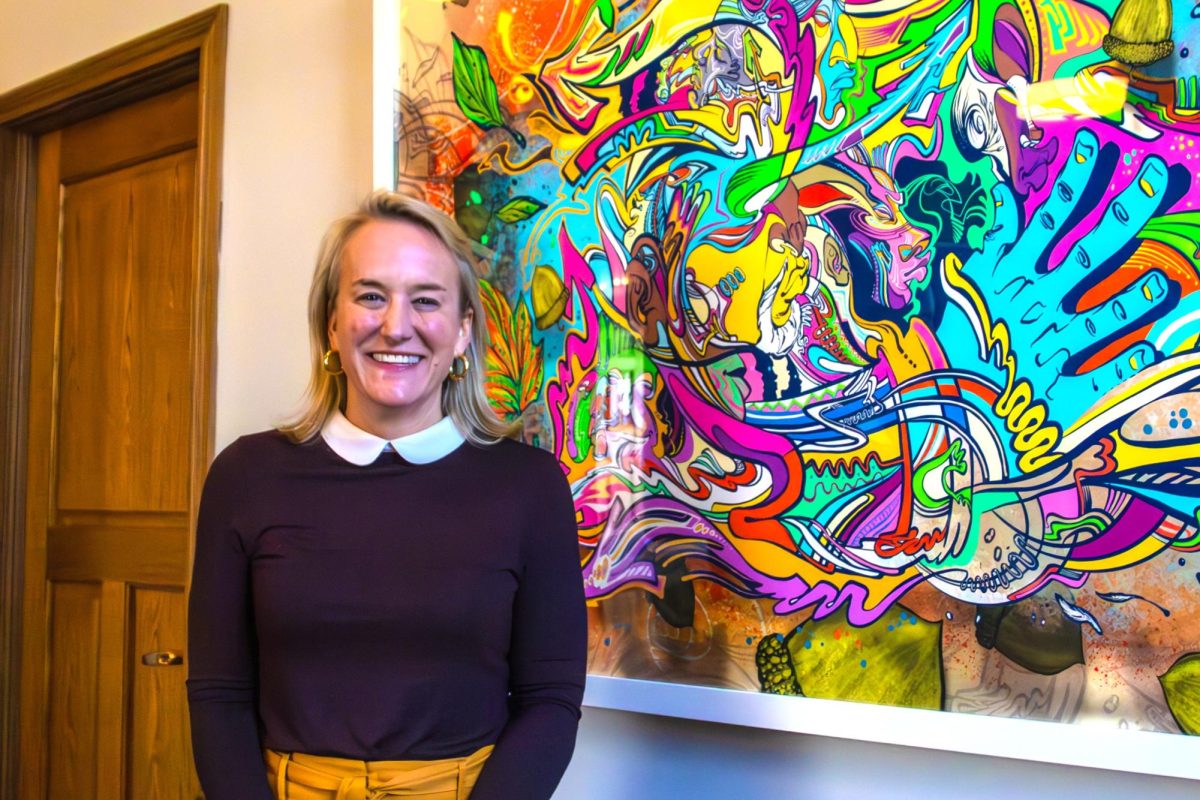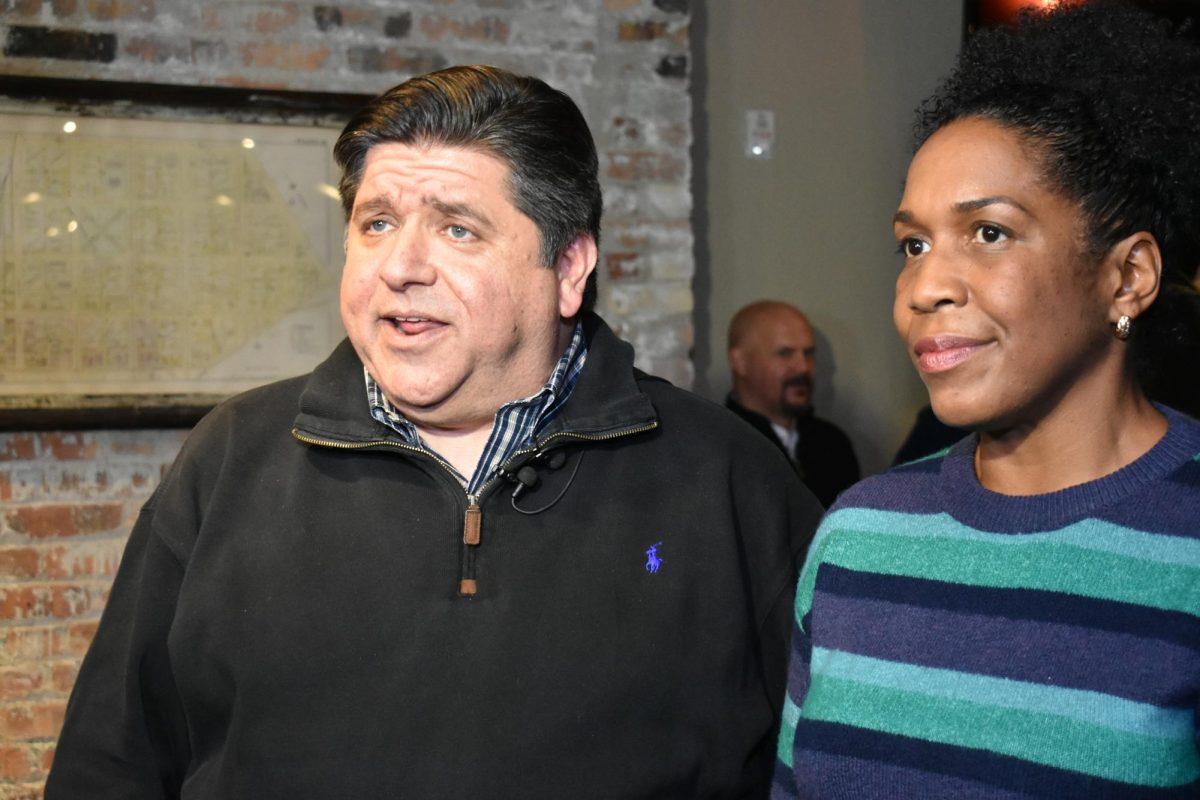Peoria native Nikki Budzinski started her political career as the former president of Illini Democrats, where she helped students with voter registration and supported local Democratic races. Almost 25 years later, she is the Democratic Representative for the 13th Congressional District of Illinois, which includes the University.
Budzinski was first elected in 2022 and flipped a contested seat formerly held by Republican Rodney Davis. Following the 2020 census, the borders of the district were redrawn in a process that saw Republicans lose two house seats and earned Democrats one during the midterms.
Budzinski now faces Republican challenger Joshua Loyd on Nov. 5. The Daily Illini sat down with Budzinski at the University YMCA to discuss her first term and her sophomore re-election campaign.
Student interests: Israel-Palestine, abortion and gun violence
Get The Daily Illini in your inbox!
The DI polled University students on Instagram prior to speaking to Budzinski. Some key issues mentioned leading up to the election were the Israel-Palestine conflict, women’s reproductive rights and gun violence.
Protestors from local pro-Palestine organizations have demonstrated outside of Budzinski’s district offices because they disagree with the Biden administration’s military support for Israel. Budzinski gave her foreign policy platform regarding the Israel-Hamas war and supported a ceasefire.
“I have had a number of conversations with some of the folks from the community that don’t necessarily agree with everything,” Budzinski said. “First and foremost, we do want de-escalation in the region, and a mutually agreed upon ceasefire is something that I think through diplomatic efforts we should always be continuing to work toward.”
Budzinski also reaffirmed her support for the U.S. government providing military aid to Israel.
“I do believe that Israel, being the only true democracy within the region and being a long-standing ally and partner, has a right to defend itself,” Budzinski said. “I have voted in support of providing them with military aid that will be able to help them ensure that they can defend themselves in cases of attack, like what had happened on Oct. 7.”
On women’s reproductive rights — a contentious topic over the past few years following the Supreme Court’s overturning of Roe v. Wade — Budzinski emphasized the importance for women to have autonomy over their bodies.
“Myself, Vice President Harris and Governor Walz believe that a woman should have the ability and her own freedom to make her own decisions about her own body,” Budzinski said. “I don’t believe that a politician needs to be in that doctor’s room with her. That is a right of privacy … and so I will always stand up on the side of that.”
Although Budzinski acknowledged her support of the Second Amendment, her platform endorses the strengthening of red flag laws, universal background checks and the elimination of military-style weapons.
“I just fundamentally believe that children should be able to go to their classroom and safely return home,” Budzinski said. “I think a part of that is addressing our gun violence epidemic and the weapons that are on our streets.”
Working-class Americans
The 13th district, which carves central and southern Illinois horizontally, is both urban and rural, including portions of Champaign County, Springfield and East St. Louis. Budzinski, who lives in Springfield, said she likes to think of her district as a microcosm of the Midwest.
“It’s a very working-class district, and so that’s why I’ve really tried to prioritize helping to create more pathways for people,” Budzinski said. “I represent some very underserved communities: East St. Louis, Cahokia Heights, the inner core of Decatur … where we’ve had a lot of systemic challenges … so creating more opportunity in every part of the district has really been a priority for me.”
The district is home to multiple colleges: the University of Illinois at Urbana-Champaign, Millikin University, the University of Illinois at Springfield and Southern Illinois University at Edwardsville. Yet, according to Budzinski, 70% of her constituents are not college-educated.
She discussed her efforts to renew the Affordable Connectivity Program, a bipartisan bill proposed by herself and Ohio Republican Mike Carey. The program aims to make internet connectivity more affordable for low-income households.
“I have some communities in my district, like East St. Louis, which are 95% reliant on the ACP supplement,” Budzinski said. “Making high-speed internet access more of a public utility that is affordable for everyone is critically important when we’re talking about driving down costs.”
Farm Bill
The 2018 Farming Bill, which provides crucial funding for agricultural and food programs, expired on Sept. 30, 2024, following a one-year extension. As Congress fell short of an agreement and is out of office until after the election, farmers are left uncertain about the future.
Budzinski chose not to vote for the House Republican version of the bill in committee, citing a $30 billion cut to the Supplemental Nutrition Assistance Food Program benefits over 10 years and favoritism for certain crops as to why.
“We grow some of the most corn and soybeans in the country right here in central Illinois and a farm bill that came out of committee, I think, picked winners and losers. Regionally, the winners in (the bill were) southern commodities, so those are rice, cotton and peanut farmers,” she said. “I want to make sure that our corn and soybean farmers (are) getting our fair share.”
She also hoped to protect conservation dollars and promote sustainable agriculture practices in the new Farm Bill.
“Smart agriculture is really important, and we moved about $14 billion from the Inflation Reduction Act into the Farm Bill. I want to make sure that those conservation dollars stay in conservation,” Budzinski said. “Republicans were trying to play some games with some of that money to again give some more support to southern commodities.”
However, she did point out the tabled Farm Bill would have promoted trade and helped certain crops. Collinsville, Illinois is the world capital of horseradish production and would have benefited from a proposed task force to study how to better support specialty crops.
At the end of the day, Budzinski said she was ready to get back in session and negotiate across the aisle to get the bill passed.
“Any farm bill that has passed over the last few decades has been done on a bipartisan basis and so that’s what I think we need to get to after the election,” Budzinski said. “Coming back to the table, negotiating these sticky points and getting the bill done.”
Unions and veterans
Budzinski is a long supporter of workers’ unions and the larger labor movement. She discussed how she plans to address the rising costs of living among working-class families, specifically in lowering prescription medication prices.
“I think the problem is the pharmacy benefit managers,” Budzinski said. “They’re the middlemen between the prescription drug, the pharmaceutical companies and the patients.”
The congresswoman said PBMs try to drive out competition and, instead, send patients to large chain pharmacies such as CVS Caremark. Budzinski said the decrease in competition leads to an increase in cost for patients.
“One of the things I’ve co-sponsored was the Pharmacist Fight Back Act,” Budzinski said. “It would create more transparency around PBMs and how they do their business.”
Budzinski added that the proposed pharmacist bill would prevent PBMs from sending patients to large-chain pharmacies, giving them the option to go to the pharmacist of their choice.
“Let’s create more competition in this market to drive down the cost of pharmaceutical drugs and make healthcare more affordable,” Budzinski said.
Budzinski also spoke on the Clear Communications for Veterans Claims Act, a bill she introduced earlier this year with two Republican representatives. The bill was passed in the House in September and made it easier for veterans to navigate the VA and obtain the benefits offered by the administration.
“What the bill will do is kind of eliminate some of the red tape and bureaucracy around that paperwork process that veterans can more easily access the benefits that they so deserve,” Budzinski said.
Women veterans are also a key policy demographic for Budzinski.
“Women veterans are actually the largest growing population in our whole veteran community,” Budzinski said. “But women have very unique needs when it comes to healthcare — specifically gender-based care.”
Budzinski said she wants to ensure women veterans have access to obstetrics, gynecology and mammograms. She also said research is being conducted on the effects of active-duty combat on women and wants to bring awareness to military sexual trauma.
“(Women’s) exposures to things could be different than their male counterparts, but we need research in order to study: How does that impact ovarian cancer? How does that impact breast cancer?” Budzinski said. “So I started a women veterans council to really study some of this.”
“I’m trying to really highlight and support funding to address military sexual trauma,” Budzinski said. “It is actually much more prevalent than what people think, and it’s very underreported.”
Reelection campaign
Budzinski left an executive position in the Biden administration to return to Illinois and explore running for office in 2022. She took the leap because she believed she would resonate with Americans despite some of her family and friends thinking it was a risky decision. Now, she said she hopes to build on her first term if reelected.
“It’s been truly the honor of my life to have this job in these last two years. And that’s why I’m running for reelection,” Budzinski said. “I am excited about a second term because I think we can build on some of the successes that we’ve had.”
One success connects to the University — the CHIPS and Science Act passed by the Biden administration infused money into American manufacturing and selected twelve tech hubs. The University won one bid and received an over $50 million investment to convert crops such as corn and soybeans into a wide range of high-value commodities.
According to the Illinois Fermentation and Agriculture Biomanufacturing Hub, “specialized processing can create more advanced types of food protein, new types of textiles and fibers, more modern polymers, commercial grades of oils/lipids, pigments and even cosmetics.”
“I like to talk about how I now represent Silicon Valley … (University, private sectors, and community colleges are) all pulling together to create this new industry in central Illinois that we believe could be potentially a $200 billion industry — we don’t get a lot of those opportunities,” Budzinski said. “I really see my second term continuing to … make sure that we’re successful.”
In her parting words to The DI, Budzinski encouraged students to seek out opportunities at the University.
“I would just urge students to get involved, maybe politics is not everybody’s calling, maybe it’s journalism or maybe it’s being active (in) RSOs on campus … but finding a way to give back,” Budzinski said.









